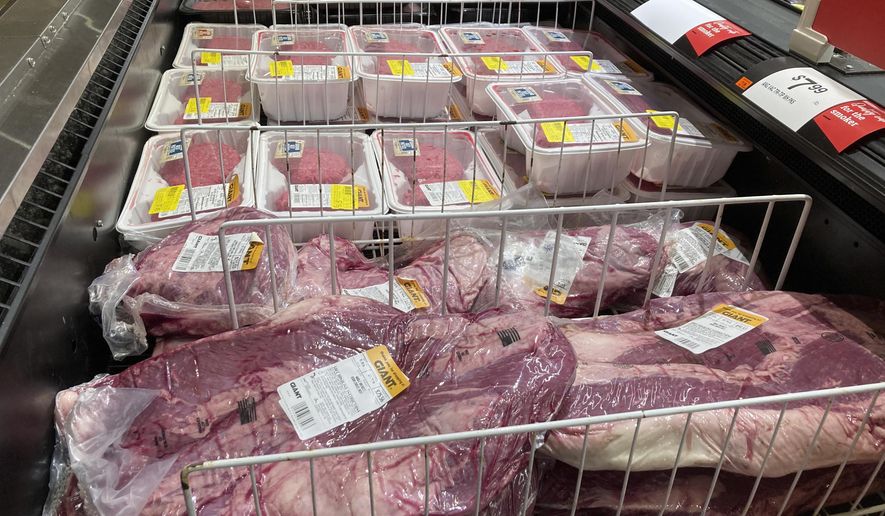Wholesale prices soared 8.3% in August from a year ago, the biggest annual gain since the Labor Department began tracking the inflation data in 2010 and potentially another sign of trouble for President Biden’s big-spending agenda.
The Labor Department reported late last week that its producer price index — which measures inflationary pressures before they reach consumers — rose 0.7% last month from July after increasing 1% in both June and July.
Wholesale food prices rose 2.9% in August and have climbed 12.7% in the past year. The price of beef has risen 59.2%.
Energy prices have risen 32.3% in the past year.
Republicans in Congress have been pointing to inflation as an argument against Mr. Biden’s push for two big-spending packages totaling more than $4.5 trillion.
The government will issue its monthly report on consumer prices on Tuesday. In July, consumer prices rose at an annual rate of 5.4%.
“Consumer prices are increasing at record levels – yet Democrats are trying to push through another $3.5 Trillion in spending,” tweeted Rep. Michelle Steel, California Republican. “American families will continue to pay the price as long as Democrats’ reckless tax and spending spree continues.”
A new White House council on economic conditions held its first meeting Friday, with participants targeting at least 18 actions taken to help consumers and potentially lower prices, the White House said.
The White House Competition Council, an outgrowth of a July executive order by Mr. Biden, is aimed at refocusing the U.S. economy around the interests of consumers, workers and entrepreneurs.
Eight cabinet members and the leaders of seven independent agencies were among the members who met to discuss the “actions they are taking to help lower prices for American families by boosting competition and to plan the group’s priorities over the coming months,” the White House said.
The group’s chair, National Economic Council Director Brian Deese, said the president’s competition agenda is key to the administration’s “Build Back Better” economic recovery plan and is “critical to keeping prices low for American consumers, spurring innovation, and allowing small businesses to compete on a level playing field,” a readout of the meeting stated.
“Middle-class Americans will feel the impact at the grocery store, when they travel to see loved ones, when they shop for internet plans, and when they purchase the medicine they need to stay healthy,” the statement said.
Mr. Deese said the council “will work together over the coming months and years to restore competition to the heart of American capitalism and deliver concrete benefits to American families.”
With signs of inflation persisting, optimism among small business owners has plummeted as Democrats race to raise taxes, according to a new poll by a right-leaning advocacy group.
The poll conducted for the Job Creators Network found that an index measuring optimism among small businesses declined to 59.4 in August, down from 63.5 in July. It was the lowest point in the four months that Republican pollsters John McLaughlin and Scott Rasmussen have been conducting the survey.
“Concerns among small business owners are mounting and it’s having a dramatic effect on how they view the future, which could impact hiring, wage growth, and the potential for business expansion as the economy weathers the lingering pandemic,” said Elaine Parker, president of the Job Creators Network Foundation. “And proposed government policies threaten to weaken the falling optimism further.”
Democrats have been previewing tax increases that they plan to impose to pay for the $3.5 trillion social-welfare spending bill that Congress is crafting. The Treasury Department has said the increases would spare 97% of small businesses.
But the Tax Foundation, a right-leaning nonprofit in Washington, estimates that slightly more small businesses would be hit. Most impactful on small businesses, according to the foundation, are proposals to raise the top marginal tax rate for high-income earners, and to tax inherited assets like stocks and businesses of more than $1 million.
The declining optimism among business owners came even before Mr. Biden announced new requirements for workers to be vaccinated or tested weekly for the coronavirus. While the requirement affects companies with at least 100 employees, the government will force many small businesses to deal with finding time off for workers to get vaccinated or tested, Ms. Parker said.
Among the survey’s other findings:
• The percentage of small businesses that described their financial condition as good or excellent declined to 57% in August, down from 60% the previous month.
• The percentage of companies expecting their financial condition to improve in the next three months fell to 53% in August, down from 62% in July.
The survey of 500 small business owners nationally from Aug. 1-19 had a margin of error of plus/minus 4.4%.
Ms. Parker said small businesses owners’ hopes had risen earlier in the summer as normal life seemed to be returning during the pandemic.
“People went on vacations again. Hotels and flights were full. People were getting out and living again,” she said.
Since then, the Consumer Price Index rose by 0.9% in June and by 0.5% in July, at a pace that is a 13-year high on an annual basis.
“That impacts feelings about hiring in the future,” she said.
At the same time, rising COVID-19 infections are raising fears of more restrictions on small businesses, like those that “hit them on the chin” last year, Ms. Parker said.
“It’s like a bizarro world,” she said. “The Biden administration said they are not affecting small businesses, but they absolutely are.”
• This article is based in part on wire-service reports.
• Dave Boyer can be reached at dboyer@washingtontimes.com.
• Kery Murakami can be reached at kmurakami@washingtontimes.com.




Please read our comment policy before commenting.